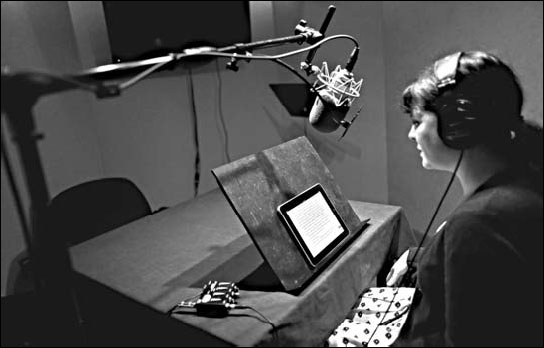Actors looking for work turn to books, not tables
Updated: 2013-07-14 08:06
By Leslie Kaufman (The New York Times)
|
|||||||||||
|
The rise of audiobooks has given many actors a steady paycheck. Katherine Kellgren has recorded nearly 200, and has even developed a fan base. Yana Paskova for The New York Times |
Gabra Zackman is a new kind of acting star: she is heard, but unheard-of.
Ms. Zackman had classical training through the Shakespeare Theater of Washington, has worked in regional theaters and has had a sprinkling of appearances on television shows. Those performances, however, have brought neither fame nor fortune.
Instead, like a growing number of actors, she has found steady employment as a reader in the booming world of audiobooks.
In recent years, Ms. Zackman has recorded more than 200 titles, and she says she can now count on two books a month, earning $1,000 to $3,000 a book.
Once a small backwater of the publishing industry, in part because of the cumbersome nature of tapes, audiobooks are now flourishing. Sales have been rising by double digits annually in recent years. A recent survey by industry groups showed that audiobook revenue climbed 22 percent in 2012 compared with 2011.
Much of the growth can be attributed to the business's digital transformation - from how books are recorded (increasingly at studios in the actors' homes) to how they are sold (through subscription or individually on the Internet) and consumed (downloaded to mobile devices).
That development is good for publishers and authors, of course. But it has also created a burgeoning employment opportunity for actors pursuing stardom, allowing them to pay their bills doing something other than waiting on tables.
Audible, the biggest producer and seller of audiobooks, says it produced some 10,000 recorded works last year - either directly or through a service it provides that allows authors to contract directly with actors. Each book amounts to an average of two or three days in the studio.
Donald R. Katz, the founder and chief executive of Audible, which was bought by Amazon.com in 2008, said that his company employed 2,000 actors to read books last year.
As with other forms of acting, compensation varies according to fame. An unknown actor might earn a few thousand dollars for a book, while stars like Nicole Kidman, who recently narrated Virginia Woolf's "To the Lighthouse" for Audible, can be paid in the hundreds of thousands.
The field is so promising that drama schools, including prestigious institutions like the Juilliard School in New York and Yale University in Connecticut, have started offering audio narration workshops.
Courtney Blackwell Burton, director of career services at Juilliard, said: "It is very exciting because it is a new source of income and work that really uses their training."

Katherine Kellgren has led narration classes at various acting schools. She said she was excited that audio narration is finally getting recognition.
Ms. Kellgren attended the London Academy of Music and Dramatic Art for three years.
Now, Ms. Kellgren, who refers to herself as an audiobook narrator instead of an actress, can command as much as $450 for each finished hour of narration.
Her style is to perform demonstrative dramatic readings, giving each character a distinct voice. She has recorded nearly 200 books and says she even has a fan base.
"It is not exactly people stopping me and saying, 'didn't you read "Pride and Prejudice and Zombies"?,'" Ms. Kellgren said, "but I have been at various book festivals and people recognize me by my work."
Another actor, Jonathan Davis, also can command a premium price. He has narrated more than 30 "Star Wars" books for Lucasfilm and Random House.
His style is more restrained than Ms. Kellgren's. "You paint the whole picture but you are very controlled," he said.
"A fan once said to me that my narration was like 'a modern version of sitting around a campfire listening to tribal elders,'" he added. "That is what makes me feel I am on the right track."
The New York Times
(China Daily 07/14/2013 page12)
Today's Top News
27 killed, 77 wounded in attacks across Iraq
French train derailment kills six: media
Former S.A President confident of Mandela
US seeking direct nuke talks with Iran
Soulik batters Taiwan, Fujian coast
Death toll rises to 43 in SW China landslide
Russia: no Snowden asylum plea yet
3rd Chinese girl dies in Asiana crash
Hot Topics
Lunar probe , China growth forecasts, Emission rules get tougher, China seen through 'colored lens', International board,
Editor's Picks

|

|

|

|

|

|






